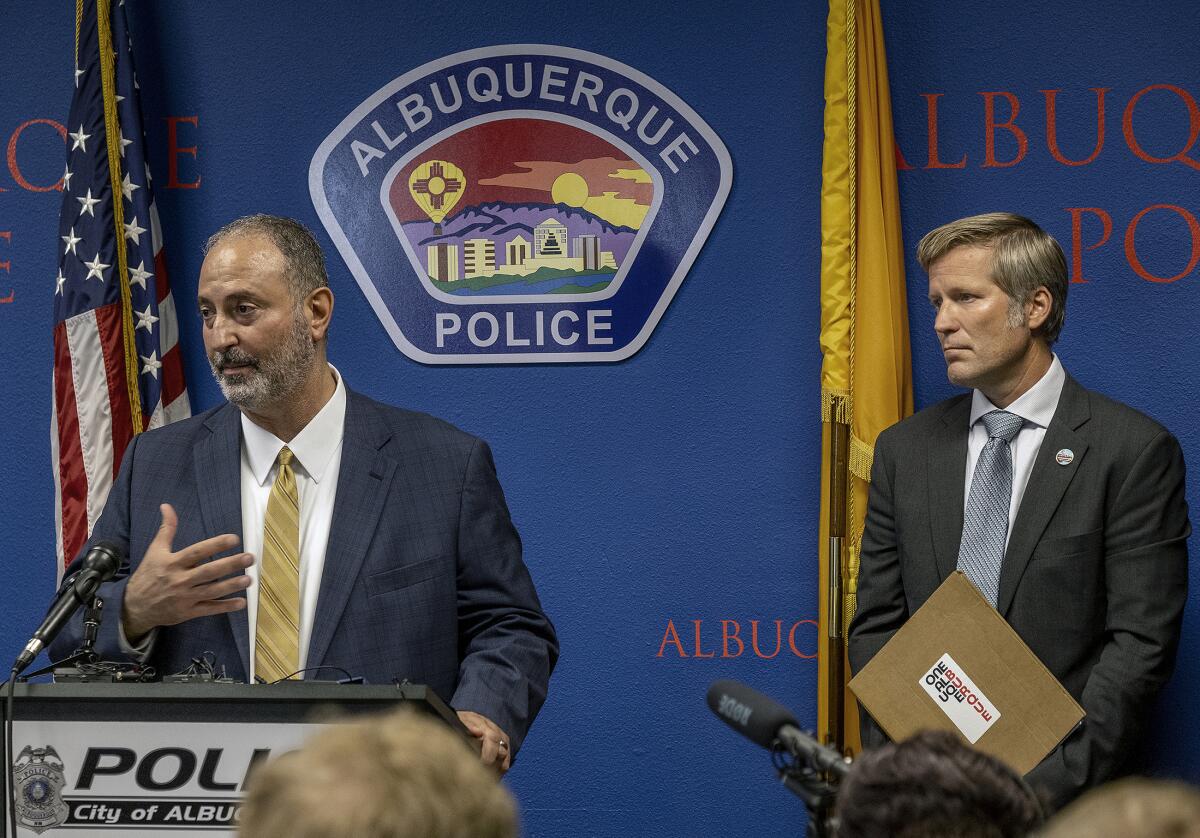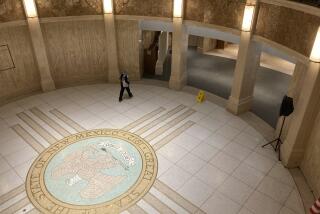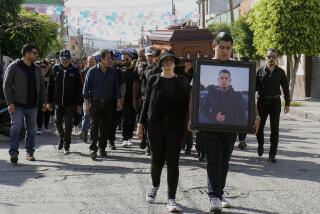Suspect in Albuquerque Muslim killings denies involvement

- Share via
ALBUQUERQUE, N.M. — After he was detained by New Mexico police, the suspect in the killings of four Muslim men in Albuquerque denied any connection to the crimes that shook the city and its small Muslim community — and told authorities he was so unnerved by the violence that he was driving to Houston in search of a new home for his family, court documents said.
The documents made public Tuesday night in a criminal complaint said Muhammad Syed, 51, had clothing, shoes and a handgun in his car when he was arrested Monday during a traffic stop more than 100 miles from his Albuquerque home.
Investigators determined that bullet casings found in Syed’s car matched the caliber of the weapons believed to have been used in two of the killings and that casings found at those crime scenes were linked to a gun found at Syed’s home, the criminal complaint said.
Syed, an Afghan immigrant, told detectives with assistance from a Pashto interpreter that he had been with the special forces in Afghanistan and fought against the Taliban, the complaint said. He also denied any involvement in the killings during the interview with detectives, according to the complaint.
The ambush killings of the four Muslim men in different outdoor locations around Albuquerque sent fear rippling through the Muslim community of New Mexico’s largest city but generated tips that led to the arrest of Syed, who knew the victims, authorities said.
He was scheduled to appear in court Wednesday afternoon. Prosecutors planned to ask that he be held without bail pending trial, and court documents did not list an attorney who could speak on his behalf.
Following the arrest, Albuquerque’s Muslim community breathed “an incredible sigh of relief,” said Ahmad Assed, president of the Islamic Center of New Mexico. “Lives have been turned upside down.”
The first killing last November was followed by three more between July 26 and Aug. 5.
Albuquerque Police Chief Harold Medina said it was not clear yet whether the deaths should be classified as hate crimes, serial killings or both.
Syed had lived in the United States for about five years, police said.
“The offender knew the victims to some extent, and an interpersonal conflict may have led to the shootings,” a police statement said, although investigators were still working to identify how they had crossed paths.
When asked specifically if Syed, a Sunni Muslim, was angry that his daughter married a Shiite Muslim, Deputy Police Cmdr. Kyle Hartsock did not respond directly. He said, “Motives are still being explored fully to understand what they are.”
Assed acknowledged that “there was a marriage,” but he cautioned against coming to any conclusions about the motivation of Syed, who occasionally attended the center’s mosque.
In 2017, a boyfriend of Syed’s daughter reported to police that Syed, his wife and one of their sons had pulled him out of a car, punching and kicking him before driving away, according to court documents. The boyfriend, who was found with a bloody nose, scratches and bruises, told police that he was attacked because they did not want her in a relationship with him.
Syed was arrested in May 2018 after a fight with his wife turned violent, court documents said. Prosecutors said both cases were later dismissed after the victims declined to press charges.
Syed also was arrested in 2020 after he was accused of refusing to pull over for police after running a traffic light, but that case was eventually dismissed, court documents said.
The Albuquerque slayings drew the attention of President Biden, who said such attacks “have no place in America.” They also sent a shudder through Muslim communities across the U.S. Some people questioned their safety and limited their movements.
“There is no justification for this evil. There is no justification to take an innocent life,” Nihad Awad, executive director of the Council on American–Islamic Relations, said at a Tuesday news conference in Washington.
He called the killings “deranged behavior.”
The first of the victims, in November, was Mohammad Ahmadi, 62, from Afghanistan.
Naeem Hussain, a 25-year-old man from Pakistan, was killed last Friday. His death came just days after those of Muhammad Afzaal Hussain, 27, and Aftab Hussein, 41, who were also from Pakistan and members of the same mosque.
Ehsan Chahalmi, the brother-in-law of Naeem Hussain, said he was “a generous, kind, giving, forgiving and loving soul that has been taken away from us forever.”
Investigators consider Syed the primary suspect in the deaths of Naeem Hussain and Ahmadi but have not yet filed charges in those cases.
The announcement that the shootings appeared to be linked produced more than 200 tips, including one from the Muslim community that police credited with leading them to the Syed family.
Police said they were about to search Syed’s Albuquerque home on Monday when they saw him drive away in a Volkswagen Jetta that investigators believe was used in at least one of the slayings.
Syed’s sons were questioned and released, according to authorities.
More to Read
Sign up for Essential California
The most important California stories and recommendations in your inbox every morning.
You may occasionally receive promotional content from the Los Angeles Times.










